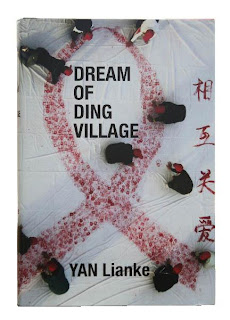I stumbled across Dream of Ding Village in the new fiction section in the library a few weeks ago. I'm not very familiar with Asian literature, mostly because I don't speak any Asian languages and I prefer to avoid reading books in translation. The premise was so interesting, though, that I checked it out anyway. I'm very glad I did. Not only was Dream of Ding Village beautifully written, it was an eye-opening look into the casualties of runaway development in modern China.
Ding Village, a small town in Henan, China (Lianke's home), becomes a bloodselling boomtown in the 1990's only to be decimated by AIDS some ten years later. Narrated by the murdered son of the town's leading bloodhead (or blood collector), Ding Hui, Dream of Ding Village tells the heartbreaking story of the town and its occupants, detailing a multitude of abuses perpetrated upon the citizens by their fellow villagers and the Chinese government and how they coped with the outbreak. Bloodheads, including (especially?) Ding Hui, were known for reusing supplies and needles, filling up the bags to the bursting point and undercompensating the peasants, and tricking people into donating more blood more frequently than they should have, not to mention lying about the true risks of blood-selling and the spread of AIDS, which is known to the villagers as "the fever." People were told that it was their civic duty to sell their blood; not only were they helping people who needed it, they were enriching their families, village, and province.
Henan was and remains one of the poorest parts of China, so the people there were especially vulnerable to heavy-handed tactics and misinformation campaigns about AIDS and how it is spread. For years, the party line of the Chinese government was that HIV/AIDS were diseases of decadent, Western society and limited to "perverts." They denied the presence of HIV in the Chinese population for years, despite abundant evidence to the contrary, which resulted in the disease spreading like wildfire through rural populations, who were unaware that needle sharing and heterosexual sex could spread the disease. Beyond that, medications available in the developed world that can slow (if not stop) the transition from HIV to AIDS simply weren't available to impoverished Chinese villagers, so when they got infected, they were left to sicken and die. In droves.
According to a few interviews of Lianke I've read online, Dream of Ding Village is a sanitized version of what actually happened; Lianke had self-censored a great deal in order to prevent it from being banned by the Chinese government (it didn't work). He had apparently left out some of the worst abuses he had come across in his research (a fact that I find frankly horrifying) and limited discussions of the Chinese government's involvement, portraying the tragedy as the work of unscrupulous local government operatives and private bloodheads. The international angle wasn't discussed, either. There's been talk of Lianke and the anthropologist he conducted his research with publishing a non-fiction work or a documentary. I hope that happens; the victims of the Chinese blood merchants deserve to have their stories told.
Overall, an excellent read. 5 out of 5 stars.

No comments:
Post a Comment